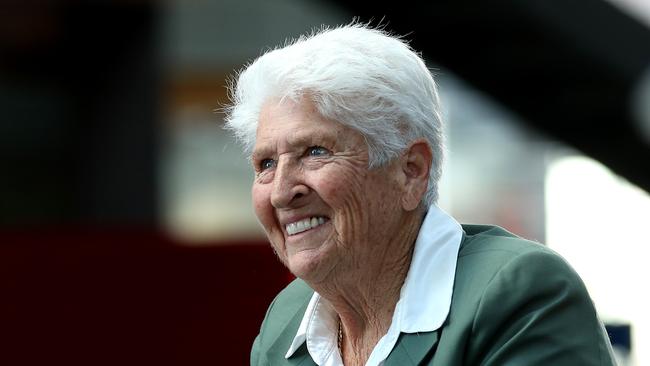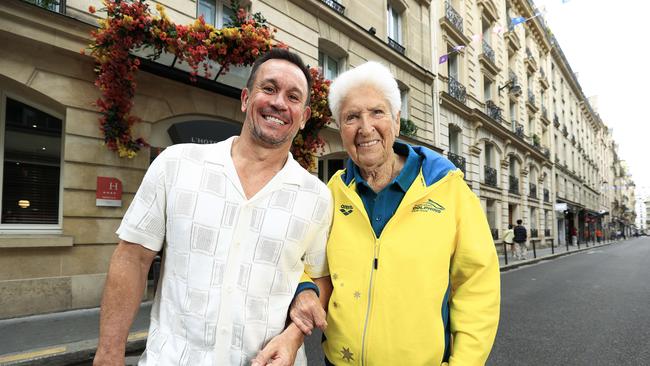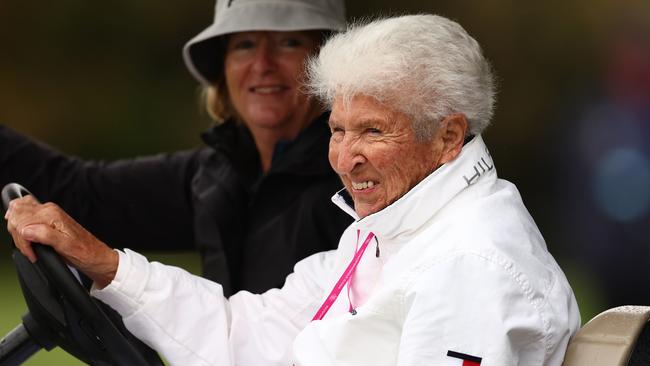Australian sporting legend Dawn Fraser rushed to hospital
Australian Olympic legend Dawn Fraser has been rushed to hospital on the Sunshine Coast after suffering “multiple injuries”.
Swimming
Don't miss out on the headlines from Swimming. Followed categories will be added to My News.
Aussie Olympic legend Dawn Fraser has reportedly been rushed to hospital after suffering multiple injuries in a fall on the Sunshine Coast.
The Daily Telegraph revealed the 87-year-old who lives at Noosa on the Sunshine Coast suffered injuries including broken ribs after a fall.
Watch selected NRL, AFL, SSN games plus every F1 qualifying session and race live in 4K on Kayo. New to Kayo? Get your first month for just $1. Limited time offer.
Fraser’s daughter Dawn-Lorraine Ware revealed to the masthead that she was “out of intensive care and doing much better than she was”, having undergone surgery yesterday following the fall.
Further details on Fraser’s injuries were revealed by Channel 10’s Matt Johnston.
“We understand she suffered several broken bones, including a serious fracture to her hip,” Johnston said on 10 News First.
“Upon arriving to hospital she was taken to emergency surgery immediately to replace that broken hip.”
Fraser is one of the greatest athletes Australia has produced, having been the face of the Melbourne 1956 Olympics where she won two golds in the 100m freestyle and 4x100m free.
She would go on to win the 100m freestyle gold at the Rome 1960 and Tokyo 1964 Olympics as well.
She also broke and held 27 world records during her career — including lowering the 100m women’s freestyle world record from 1:04.5 when she first broke it at the Australian Championships in 1956, to 58.9 seconds the 11th and final time she lowered the mark.
Fraser was the first female athlete elevated to Legend status by the Australian Sport Hall of Fame (ASHF) back in 1993.

The Sport Australia Hall of Fame also named an award after her as of 2021 — The Dawn Award — recognising an individual, team, or organisation – from this or a previous generation – who are courageous, brave, and have changed sport for the better.
The award has been given to tennis legend Evonne Goolagong-Cawley (2021), athletics icon Peter Norman (2022), the 2000 Olympic women’s water polo team (2023) and basketball superstar Lauren Jackson (2024).
At the time, the ASHF wrote: “Dawn Fraser was … one of the most decorated athletes in Australian sport history while demonstrating the larrikin behaviour to match her ability.
“Her record in the pool included eight Olympic medals, six British Empire and Commonwealth gold medals and setting 23 individual world records and 12 as part of a team.
“Dawn’s dominance of the 100m freestyle was part of her legacy, claiming the Olympic title at the 1956 Melbourne, 1960 Rome and 1964 Tokyo Games, the first swimmer (of either gender) to win gold in three successive Games.”

Fraser was also the first woman to break the minute barrier in the 100m freestyle and has been the standard bearer for Australian swimming over the decades since her career in the pool ended.
After the 1964 Olympics, Fraser was banned from competitive swimming for 10 years after she defied a ban from the Australian Swimming Union on marching in the opening ceremony of the Tokyo Games, as well as refusing to swim in a suit that had been supplied by Australian sponsors during the heats.
She was also accused of stealing an Olympic flag from a flagpole outside Emperor Hirohito’s palace and arrested, but was released without charge.
Speaking to the ABC’s Monica Attard in a piece called Dawn Fraser Still Kicking in 2007, Fraser revealed that after finishing her Olympic requirements, she left the village and stayed a the Imperial Palace hotel.
After celebrating with the Australian men’s hockey team who had just won its first bronze medal in Olympic history, before the team doctor said: “Fraser, are you interested in getting a flag?”
“As we walked out the hotel it was the big avenue leading up to the Imperial Palace, and if you’ve been to Tokyo you know that you can’t get into the Imperial Palace,” Fraser said at the time.

“And outside of there was an avenue of Olympic flags, and we got two flags down.
“Both Doc and I hoicked him (Des Piper) up there and he got the rope down and got the couple of flags down, and we got two flags down, and the next thing there were whistles blowing everywhere, the police had seen us, we’d been spotted, and they started to chase us. So we ran.
“I jumped down off the garden, and I didn’t realise it was about seven feet tall, the garden, and because where we’d run it was very dark and I couldn’t see, and I jumped down onto this, on the footpath, I thought I’d get away. But unfortunately I didn’t, and that’s when I tore all the tendons in my ankle.
“I sat in the park for a little while, and Doc and Des got caught, and the next minute a couple of policemen found me in the park. I was sitting on the bench, and they asked me what I was doing, and I said ‘I was waiting for some friends’, and they said ‘no’, and I had the flag stuck up underneath my tracksuit.”
Ultimately after being arrested and finally bringing some ID and her Olympic gold medal, Fraser revealed she was warned “that it was a stealing offence, it could mean a jail term” but “because of who I was, Dawn Fraser, they let us off”.
And she was given the flag by the next day — which she sold at her testimonial for $75,000 before it was gifted back to her daughter.
Fraser was also named Australian of the Year in 1964, and was also elected to NSW parliament for Balmain between 1988 and 1991.
She was also made a member of the order of the British Empire (MBE) in 1967, an Officer of the Order of Australia (AO) in 1998 and Companion of the Order of Australia (AC) in 2018, the Australian Female Athlete of the Century by the Sport Australia Hall of Fame in 1985 and the world’s greatest living female water sports champion by the International Olympic Committee in 1999.
Originally published as Australian sporting legend Dawn Fraser rushed to hospital




